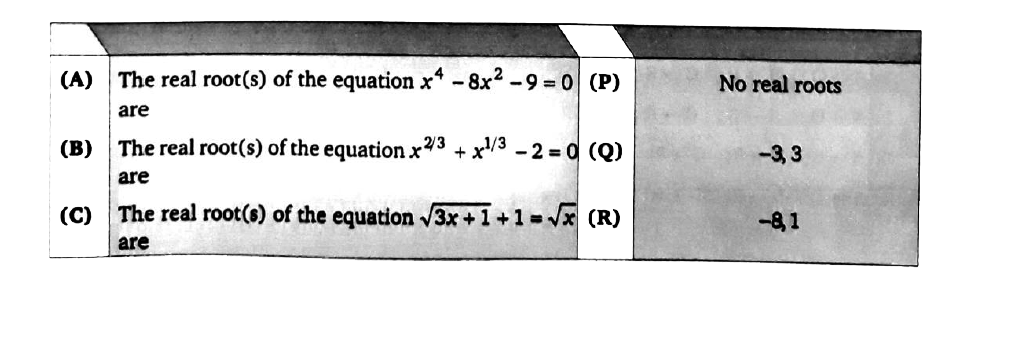a,b,c,∈R,a≠0 and the quadratic equation ax2+bx+c=0 has no real roots, then which one of the following is not true?
(a+b+c)(a−b+c)>0
(a+b+c)(a−2b+4c)>0
(a−b+c)(4a−2b+c)>0
a(b2−4ac)>0
The correct Answer is:A, B, D
Step by step video, text & image solution for a, b, c, in R, a ne 0 and the quadratic equation ax^(2) + bx + c = 0 has no real roots, then which one of the following is not true? by Maths experts to help you in doubts & scoring excellent marks in Class 12 exams.
Updated on:21/07/2023Topper's Solved these Questions
- QUADRATIC EQUATIONS Book:VIKAS GUPTA (BLACK BOOK)Chapter:QUADRATIC EQUATIONS Exercise:EXERCISE (COMPREHENSION TYPE PROBLEMS)
Explore 23 Videos
- QUADRATIC EQUATIONS Book:VIKAS GUPTA (BLACK BOOK)Chapter:QUADRATIC EQUATIONS Exercise:EXERCISE (MATCHING TYPE PROBLEMS)
Explore 1 Video
- QUADRATIC EQUATIONS Book:VIKAS GUPTA (BLACK BOOK)Chapter:QUADRATIC EQUATIONS Exercise:EXERCISE (SUBJECTIVE TYPE PROBLEMS)
Explore 45 Videos
- PROBABILITY Book:VIKAS GUPTA (BLACK BOOK)Chapter:PROBABILITY Exercise:Exercise -5 : Subjective Type problems
Explore 12 Videos
- SEQUENCE AND SERIES Book:VIKAS GUPTA (BLACK BOOK)Chapter:SEQUENCE AND SERIES Exercise:EXERCISE (SUBJECTIVE TYPE PROBLEMS)
Explore 21 Videos
Similar Questions
Let f(x)=ax2+bx+c,a≠0, such the f(−1−x)=f(−1+x)∀x∈R. Also given that f(x)=0 has no real roots and 4a+b>0.
Let α=4a−2b+c,β=9a+3b+c,γ=9a−3b+c, then which of the following is correct ?
View Solution
View SolutionLet f(x)=ax2+bx+c where a,b,c are integers. If sin π7⋅sin 3π7+sin 3π7⋅sin 5π7+sin 5π7⋅sin π7=f(cos π7). then find the value of f(2):
View SolutionMr. A writes an article. The article originally is error free. Each day Mr. B introduces one new error into the article. At the end of the day, Mr. A checks the article and has 23 chance of catching each individual error still in the article. After 3 days, the probability that the article is error free can be expressed as pq where p and q are relatively prime positive integers. Let λ=q−p, then find the sum of the digits of λ.
View SolutionLet a,b,c,d be four distinct real numbers in A.P. Then half of the smallest positive valueof k satisfying a(a−b)+k(b−c)2=(c−a)3=2(a−x)+(b−d)2+(c−d)3 is __________.
View Solutiona,b,c∈R,a≠0 and the quadratic equationax2+bx+c=0 has no real roots, then
View SolutionThe quadratic equation ax2+bx+c=0 has real roots if:
View Solutiona,b,c,∈R,a≠0 and the quadratic equation ax2+bx+c=0 has no real roots, then which one of the following is not true?
View Solutionयदि a, b व c वास्तविक संख्याएँ इस प्रकार हों की ac≠0 तो प्रदर्शित करो की समीकरण ax2+bx+c=0 तथा −ax2+bx+c=0 में से कम-से-कम एक समीकरण के मूल वास्तविक होंगे।
View SolutionLet a,b,c∈Randa≠0 be such that (a+c)2<b2 ,then the quadratic equation ax2+bx+c=0 has
View SolutionStatement -1 : The quadratic equation ax2+bx+c=0 has real roots if (a+c)2>b2,∀,a,b,c∈R .
and
Statement -2 : The quadratic equation ax2+bx+c=0 has real roots if b2−4ac≥0
View SolutionIf the quadratic equation ax2+bx+c=0 has −2 as one of its roots then ax+by+c=0 represents
View SolutionIf a,b,c belong to R,a≠0, and the quadratic equation ax2+bx+c=0 has no real roots. Then , which one of the following is correct?
View SolutionIf a,b,c∈R : a≠0 and the quadratic equation ax2+bx+c=0 has no real root, then show that (a+b+c)c>0
View SolutionIf the quadratic equation ax2+bx+c=0 has -2 as one of its roots, then ax+by+c=0 represents
View SolutionThe roots of a quadratic equation ax2−bx+c=0,a≠0 are
View Solution
